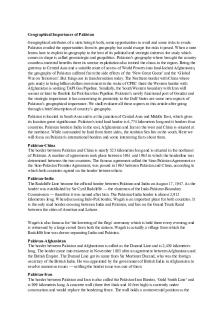Judicial System of Pakistan PDF

| Title | Judicial System of Pakistan |
|---|---|
| Course | Business administration |
| Institution | University of Central Punjab |
| Pages | 2 |
| File Size | 84.2 KB |
| File Type | |
| Total Downloads | 77 |
| Total Views | 150 |
Summary
Judical System of Pakistan...
Description
Judicial System of Pakistan The Law of Pakistan is based on the legal system of Islamic Republic of Pakistan. The Judiciary of Pakistan is a hierarchical system with two classes of courts: the superior judiciary and the subordinate judiciary. The superior judiciary is composed of the Supreme Court of Pakistan, the Federal Sharia Court and five High Courts, with the Supreme Court at the apex. We can divide the courts as follows
Supreme Court: It is the court of ultimate appeal and therefore the final arbiter of law and the constitution. Its decisions are binding on all other courts. The Court consists of a Chief Justice and other judges, appointed by the President as per procedure laid down in the Constitution. An Act of Parliament has determined the number of judges. The number fixed at the moment is Chief Justice and 16 judges.
High court: There is a High Court in each province and a High Court for the Islamabad Capital Territory. Each High Court consists of a Chief Justice and other judges. The strength of Lahore high Court is fixed at 60, High Court of Sindh at 40, Peshawar High Court at 20, High Court of Baluchistan at 11 and Islamabad High Court at 7.
District and Sessions Court: District courts exist in every district of each province, and have civil and criminal jurisdiction. Each Town and city now has a court of Additional District & Sessions judge, which possess the equal authority over, under its jurisdiction. When hearing criminal cases, it is called the Sessions Court, and when it hears civil cases, the District Court. Executive matters are brought before the relevant District & Sessions Judge.
Federal Shariah Court: The Court consists of 8 Muslim Judges including the Chief Justice .Procedure for appointment of judges of Federal Shariah Court has been changed after 18th and 19th amendments as previously such judges were appointed by the President from amongst the serving or retired judges of the Supreme Court or a High Court or from amongst persons possessing the qualifications of a judge of the High Court.
Family Courts: The West Pakistan Family Courts Act 1964 governs the jurisdiction of Family Courts. These courts have exclusive jurisdiction over matters relating to personal status. Every town and city or Tehsil has court of family judge. In some areas, where it is only Family Court but in most areas Civil Judge Courts have been granted the powers of Family Court Judges. According to section 17 of the Family Court Act, 1964, the provisions of C.P.C. (Civil Procedure Code) and Qanun-e-Shahdat Order (Evidence Law) are not applicable over to Family Court and the same are allowed forming or regulating its own procedure to decide case expeditiously, properly and in the best interest and convenience of lady litigants.
Juvenile Courts: Juvenile justice in Pakistan deals with crimes committed by Pakistani children. The minimum age for criminal responsibility in Pakistan is seven years. In July 2000, the then government under General Pervez Musharraf enacted the JSSO (Juvenile Justice System Ordinance 2000, according to SPARC (2001) its implementation is incomplete. A survey of juvenile prisoners lodged in 51 jails in the four provinces of Pakistan exposed most degrading conditions. Hardly any facilities existed for rehabilitation and often the punishment was too severe for the crimes committed....
Similar Free PDFs
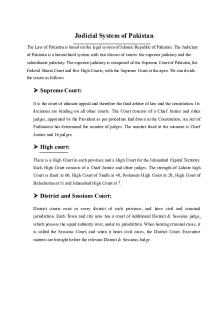
Judicial System of Pakistan
- 2 Pages
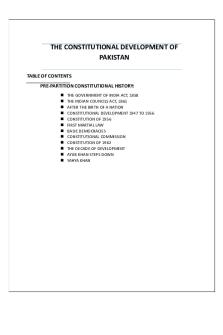
Constitutional History of pakistan
- 16 Pages
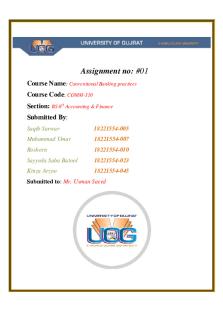
25 Banks of PAKISTAN
- 25 Pages

Climatic Regions of Pakistan
- 2 Pages
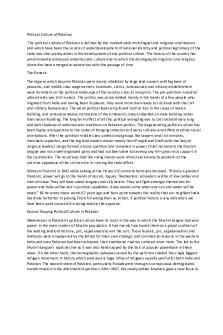
Political culture of Pakistan
- 11 Pages

Separation of Judicial Power
- 3 Pages
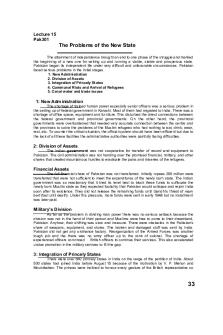
01 Early Problems of Pakistan
- 2 Pages
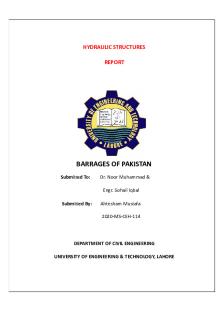
Barrages of Pakistan detail study
- 17 Pages
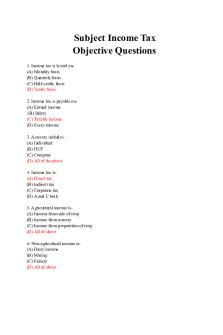
MCQs of Income Tax Pakistan
- 10 Pages
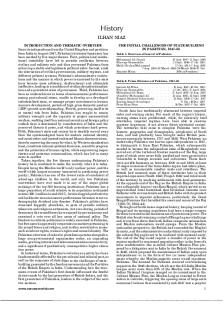
History Of Pakistan 1947-2017
- 15 Pages

Wildlife of Pakistan Mar 2012
- 62 Pages

History (Of Pakistan, 1947-2019)
- 16 Pages

MCQs of Income Tax Pakistan
- 10 Pages
Popular Institutions
- Tinajero National High School - Annex
- Politeknik Caltex Riau
- Yokohama City University
- SGT University
- University of Al-Qadisiyah
- Divine Word College of Vigan
- Techniek College Rotterdam
- Universidade de Santiago
- Universiti Teknologi MARA Cawangan Johor Kampus Pasir Gudang
- Poltekkes Kemenkes Yogyakarta
- Baguio City National High School
- Colegio san marcos
- preparatoria uno
- Centro de Bachillerato Tecnológico Industrial y de Servicios No. 107
- Dalian Maritime University
- Quang Trung Secondary School
- Colegio Tecnológico en Informática
- Corporación Regional de Educación Superior
- Grupo CEDVA
- Dar Al Uloom University
- Centro de Estudios Preuniversitarios de la Universidad Nacional de Ingeniería
- 上智大学
- Aakash International School, Nuna Majara
- San Felipe Neri Catholic School
- Kang Chiao International School - New Taipei City
- Misamis Occidental National High School
- Institución Educativa Escuela Normal Juan Ladrilleros
- Kolehiyo ng Pantukan
- Batanes State College
- Instituto Continental
- Sekolah Menengah Kejuruan Kesehatan Kaltara (Tarakan)
- Colegio de La Inmaculada Concepcion - Cebu
